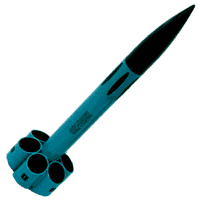| Construction Rating: | starstarstarstarstar_border |
| Flight Rating: | starstarstarstarstar_border |
| Overall Rating: | starstarstarstarstar_border |
| Manufacturer: | Rocket Vision |
 I just finished building the Six-Pack by Rocket Vision.
For those who aren't familiar with it, it uses the same body tube/nose
cone/recovery system as their Mach Buster.
The difference is in the six tubular fins that provide guidance.
I just finished building the Six-Pack by Rocket Vision.
For those who aren't familiar with it, it uses the same body tube/nose
cone/recovery system as their Mach Buster.
The difference is in the six tubular fins that provide guidance.
I ordered one of these for two reasons: One, because like all of the other rockets in their fleet, it is really hard-core rugged. I expect to be able to fly it scores of times before it needs repair. This leads me to my second reason, it becomes very economical as the number of flights eats away at the initial sunk costs of labor and material. I do aerospace summer camps and travel around to different schools putting on these programs. I'll fly 15 or so rockets in a 90 minute session. Since I do 10 of these programs in a five day period, I need rockets that will remain functional throughout the week. So far, Rocket Vision rockets are the only rockets capable of doing that.
Now down to the building process. The box arrived via USPS in about three days time (WA to CA). A close examination of the contents showed all parts present and ready for assembly. I also noted that the instructions for this kit still carry the Impulse Aerospace labeling. No problem in that, just a point of interest. Next, a quick review of the instructions showed that, for the most part, if you were new to rocketry, this kit would not be a good thing for you to cut your teeth on as I shall explain.
The details consisted of an 11 X 17 inch sheet; on one side you have an exploded diagram of the rocket and eight little paragraphs describing the assembly process for each of the components. The diagram was excellent and the paragraphs were clear and readily understandable. The reverse side of the sheet listed the company policy or mission statement, a HUGE disclaimer that in a nutshell says, "we built a good and safe product but cannot warranty that your mom and dad did the same, be safe!", warranty information, a list of kit contents, tools required, some flight instructions and a very readable statement of the NAR model rocket safety code. All-in-all, everything an experienced modeler needs and nothing more.
For a novice, the kit lacks the reassuring assembly photos that come in Estes type kits. Not a big problem really; certainly no problem at all for the builder with several rockets under his/her belt. There is also not much information on the use of assembly jigs or other such tricks. That would be helpful here because getting the cylinders/fins aligned and held in place until the glue sets is not easy unless you know a thing or two. Again, this is why I say that Novice builders may have difficulty with this kit.
Finally, it should be noted that while the materials list includes reference to both 5 and 20 minute epoxy, the instructions fail to tell the builder where to use one and not the other. In fact, in the assembly paragraphs, no mention of which type of adhesive to use is made at all. Nor is there any mention of filleting these tubes though the picture that accompanies the instructions shows fillets between the fin tubes. As an experienced builder, I know that the 5 minute stuff is for fixing the tubes in place and the 20 minute is for filleting. however, I recommend putting this in the instructions in the future. (My instructions were marked Version 1.1 so perhaps this change has already been made)
There was also an addendum about the shock cord mounting. The instructions called for mounting the cord by knotting one end and then running the cord through the BT and locking it in place by sandwiching it between the BT and the MMT with the knot extending out the aft end of the rocket. I liked this idea and used it. The alternate was to do an Estes type installation and glue the cord to the inside of the BT a couple of inches below the NC using a section of MMT that is provided for this purpose. This is the method described in most of their later kits. It's OK, but since the BT is already cramped for space, I prefer the first method over the latter.
Another step that was omitted from the instructions was the sanding and shaping of the fins. One could use them as they were packaged but the square edges and the thickness of the material work together to make the bird look clumsy and rough. After sanding and rounding the mouths of the fin tubes, a much more streamlined appearance was achieved and drag was reduced considerably. No doubt, an experienced builder would see to do this right from the start. However, a novice might not notice it until the bird was assembled making any such refinements a real pain. As it was, a few passes with the Dremel sanding drum and a few strokes with some 200 grt. paper and everything was perfect.
The rest of the assembly went together quickly, as these Rocket Vision kits are inclined to do. Painting and flight testing are set for today and tomorrow respectively. After thinking it over, I would definitely recommend this kit but with the caveat that someone would benefit from having some experience before getting started. For a newly or a BAR with no recent experience, this kit may prove a bit frustrating in that it assumes a degree of knowledge on the part of the builder. (A primary example of this is found in the lack of assembly sequencing. The builder must instinctively know that you begin with the step listed in the upper left corner of the instructions and follow the steps around the picture in a clockwise manner. The steps are NOT numbered.) Otherwise, it's a very easy kit to build and it results in an interesting rocket.
Construction Rating: 4 out of 5
Flight:
Test flights with this model were without problems. For the maiden flight, I
used a B4-2. Since the model is designed for 24mm motors an adapter is
required. In this case, I used a spent D motor case with a thrust ring glued
into one end. I tape wrapped the adapter and snugged it in place. I then
wrapped tape around one end of the B motor to act as a thrust ring (a la HP)
and wrapped tape around the B casing until a snug fit in the adapter was
achieved.
I removed the Nomex® chute protector and went with standard wadding. I used the Quest wadding for this rocket. Unlike the Estes material which comes folded like toilet paper without a roll, the Quest material is packaged in individual light plue sheets. It has a crisp feel to it and is much less prone to burn through and clumping. I loaded three sheets of wadding and folded the chute carefully. I have found that long and thin ejects easier than short and fat so I fold the chute accordingly.
The boost was straight and there was no evidence of weather cocking despite of 15 mph winds. The chute deployed while the rocket was still coasting at an altitude of approx. 150 feet. The second flight was under a C5-3. Again, straight boost and deployment before apogee. I estimate about 300 feet was the peak altitude. The final flight of the day used a C6-7. This time I got more than 400 feet with deployment occurring AFTER apogee.
Recovery:
The recovery using wadding as opposed to the Nomex® protector went without
flaws. I think the descent is a tad on the fast side. I was flying over grass
but on concrete or dry lake bed I am certain that damage would occur to the
rocket. The shock cord looked flamed but there was no evidence of burn through
or excessive scorching. Some small holes were found in the chute. Maybe a 4th
sheet of wadding would prevent that. Otherwise, all went well.
Flight Rating: 4 out of 5
Summary:
The main PROs of this rocket are:
- It is VERY sturdy. You will have to work at breaking it.
- It builds quickly and easily.
- It finishes VERY well. No fin filling, no spirals to fill, looks like metal when painted.
- It flies well on a wide variety of motors.
Principle CONs are as follows:
- The instructions assume experience and prior knowledge.
- The Nomex® system is too bulky for the BT
- The rocket is very heavy.
There are basically three schools of thought on rocket durability. One can built them very light and draggy, one can built them with huge chutes and one can build them using HD materials and techniques. The Big Bertha is a primary example of the first school. It is very light, has high drag and compact fins with a lot of root area. I've flown mine more that 50 documented times without a single case of breakage. The second school is represented by the Big Bertha as well. It comes standard with a large chute and its descent rate is very low. The third school is the direction that Rocket Vision designers have chosen. It works quite well but still not as well as a combination of methods one and two. The chief advantage that method three has over the other two is that power limits must be kept within the low to moderate range in the first two but the sky's the limit with method three. If it'll fit, you can use it. Clearly, if power is your thing, then the rockets from Rocket Vision will not let you down.
Overall Rating: 4 out of 5
"Since RJ posted this review we've completely revised our instructions to make them easier to follow, and we've added online Assembly Guides to provide photographs of virtually all the assembly steps. We've also increased the length of the airframes on all our kits in order to provide more room for the recovery system." - Janet S. Hendrickson - Rocket Vision's Director of Marketing
Other Reviews
- Rocket Vision Six-Pack By R. J. Talley
(06/02/01) I purchased another Rugged-Rocket, the Rocket Vision Six-Pack, to have built and fly on a vacation in Arizona . . . right after which it was announced that Rocket Vision was going out of business. Oh, well, I'll go ahead and give it a quick review and add it to my newest comparison page on Tube-Fin rockets. See my Tube-Fin Rocket Comparison Page I never had a Tube-Finned ...
 |
 |
Flights
Sponsored Ads
 |
 |











